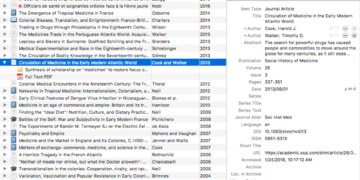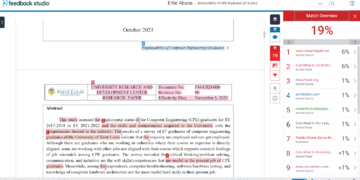Researchers procrastinate just like anyone else. However, procrastination can hinder the scientific process by delaying crucial experiments, data analysis, and the publication of results. While some researchers may excel at managing their time and avoiding procrastination, others may find it more challenging to stay on track with their work. Understanding the psychological triggers behind procrastination can help researchers develop strategies to overcome these barriers and enhance their productivity. In this comprehensive blog post, we’ll explore the top 5 psychological triggers of procrastination in research and provide practical solutions to combat them.
Understanding the Trigger
Fear of failure is a powerful psychological trigger that can paralyze researchers and lead to procrastination. The anxiety of not meeting high standards or making mistakes can prevent researchers from starting or completing their work. This fear often stems from a perfectionist mindset, where the individual feels that anything less than perfect is unacceptable. As a result, researchers might delay tasks to avoid the potential embarrassment or disappointment associated with failure.
How to Combat It
- Set Realistic Goals: Break down research tasks into smaller, manageable goals. This reduces the pressure and makes tasks feel less daunting. When tasks are broken into bite-sized pieces, it’s easier to see progress and maintain momentum.
- Focus on Progress, Not Perfection: Shift your mindset from achieving perfection to making steady progress. Celebrate small wins and improvements. Acknowledging and appreciating your progress can motivate you to continue working, even when things aren’t perfect.
- Embrace Mistakes as Learning Opportunities: Recognize that mistakes are a natural part of the research process. Use them as opportunities to learn and grow rather than as reasons to procrastinate. Understanding that failure is a stepping stone to success can alleviate the fear and encourage a more proactive approach.
Practical Tips
- Create a Detailed Project Plan: Outline your research project with achievable milestones. Having a clear plan helps in visualizing the path to completion and reduces the uncertainty that often leads to fear of failure.
- Use Positive Self-Talk: Build confidence and reduce fear by replacing negative thoughts with positive affirmations. Remind yourself of past successes and your ability to overcome challenges. Positive self-talk can transform your attitude towards tasks and diminish the fear of failure.
- Seek Feedback: Regularly seek constructive feedback from peers or mentors. This not only helps in improving your work but also builds resilience against the fear of failure. Knowing that you can adjust and improve based on feedback can reduce the pressure of getting everything perfect on the first try.
- Practice Self-Compassion: Treat yourself with kindness and understanding when you encounter setbacks. Recognize that everyone makes mistakes and that your worth is not defined by your failures. Self-compassion can reduce the fear of failure and encourage a healthier, more productive approach to research.
Understanding the Trigger
Research tasks can often be complex and overwhelming, leading to procrastination as researchers may struggle with where to start or how to manage the workload effectively. The sheer volume of information and the intricacy of some research projects can make it difficult to break tasks down into manageable pieces, causing researchers to feel paralyzed by the enormity of their work.
How to Combat It
- Break Tasks into Smaller Steps: Divide large tasks into smaller, actionable steps. This makes them less overwhelming and easier to tackle. By focusing on one small task at a time, you can make consistent progress and reduce the sense of being overwhelmed.
- Prioritize Tasks: Use tools like the Eisenhower Matrix to categorize tasks by urgency and importance. Focus on high-priority tasks first. This method helps you identify what needs immediate attention and what can be scheduled for later, ensuring that critical tasks are completed on time.
- Create a Structured Schedule: Develop a detailed schedule that allocates specific time blocks for each task. This helps in managing workload and reduces feelings of overwhelm. Having a clear plan for when and how long you will work on each task can help you stay organized and on track.
Practical Tips
- Use Project Management Tools: Tools such as Trello or Asana can be invaluable for organizing and tracking tasks. These platforms allow you to create task lists, set deadlines, and monitor progress, providing a clear visual representation of your workload.
- Implement Time-Blocking Techniques: Allocate specific periods during the day for focused work on particular tasks. This ensures dedicated time for each task and helps prevent procrastination. For example, you might block off two hours in the morning for literature review and another two hours in the afternoon for data analysis.
- Set Achievable Milestones: Break your project into phases with clear milestones. Achieving these smaller goals can provide a sense of accomplishment and motivation to continue progressing.
- Delegate or Seek Help: If certain tasks are too complex or time-consuming, consider delegating them to colleagues or seeking assistance. Collaboration can lighten your workload and provide new perspectives on challenging tasks.
- Practice Mindfulness and Stress-Reduction Techniques: Engage in mindfulness practices, such as meditation or deep-breathing exercises, to manage stress and maintain focus. Reducing stress can help alleviate feelings of overwhelm and improve your ability to tackle complex tasks.
Understanding the Trigger
A lack of motivation can stem from various factors, including disinterest in the topic, burnout, or unclear research objectives. When motivation wanes, procrastination often follows. This can be particularly challenging for researchers who may feel disconnected from their work, struggle with the long-term nature of their projects, or experience fatigue from constant pressure and high expectations.
How to Combat It
- Find Intrinsic Motivation: Connect your research to personal interests or long-term goals. Understanding the impact and relevance of your work can reignite motivation. Reflect on why you chose your field and how your research contributes to the broader scientific community or society.
- Set Clear Objectives: Define clear and specific research goals. Knowing what you need to achieve can boost motivation and focus. Breaking down your project into smaller, achievable targets can make the work feel more manageable and provide a sense of direction.
- Incorporate Rewards: Implement a reward system for completing tasks or reaching milestones. This can enhance motivation and create positive reinforcement. Rewards can range from small treats for daily achievements to larger incentives for major milestones.
Practical Tips
- Reflect on Your Research Goals: Take time to consider the significance of your research and its potential impact. Writing a personal mission statement or revisiting your initial research proposal can help rekindle your passion and interest.
- Create a Reward System: Design a system that incentivizes task completion. For example:
- Daily Rewards: Treat yourself to something enjoyable, like a favorite snack or a short break, after completing daily tasks.
- Milestone Rewards: Plan bigger rewards for reaching major project milestones, such as a dinner out, a day off, or purchasing something you’ve wanted.
- Visualize Success: Create a vision board or a list of the positive outcomes you expect from completing your research. Visualizing success can boost motivation by keeping the end goal in sight.
- Seek Inspiration: Read success stories of other researchers in your field or attend conferences and seminars. Exposure to new ideas and achievements can reignite your enthusiasm for your own work.
- Maintain a Balanced Lifestyle: Ensure that you are not overworking yourself. Regular breaks, physical activity, and social interactions can help prevent burnout and maintain a high level of motivation.
- Collaborate with Others: Engage with peers or mentors to discuss your research. Collaboration and feedback can provide new perspectives, reduce feelings of isolation, and increase your motivation.
Understanding the Trigger
Perfectionism can lead to procrastination when researchers set unrealistically high standards for their work. The constant striving for perfection can create paralysis and delay task completion. Perfectionists often fear that their work will never be good enough, leading to endless tweaking and an inability to finish tasks. This cycle of self-criticism and high expectations can be mentally exhausting and counterproductive.
How to Combat It
- Set Realistic Standards: Understand that perfection is unattainable and set achievable standards instead. Aim for high-quality work rather than perfection. Recognize that good work can be good enough and that continuous improvement is more important than flawless outcomes.
- Adopt a Growth Mindset: Embrace a growth mindset that focuses on continuous improvement rather than perfect outcomes. Accept that mistakes and failures are part of the learning process and can lead to better results in the long run. This perspective can reduce the pressure to be perfect and encourage a more productive approach.
- Limit Revisions: Set a time limit for revisions and stick to it. Excessive revisions can lead to procrastination and stalling. Decide on a reasonable number of review rounds and a deadline for finalizing your work to avoid getting stuck in an endless cycle of editing.
Practical Tips
- Use a Checklist: Define acceptable quality standards for your work using a checklist. This can include specific criteria that need to be met, helping you focus on what’s essential and avoid getting bogged down by minor details.
- Allocate Specific Time for Revisions: Schedule dedicated time blocks for revisions and adhere to them. For example, you might allow one hour for initial revisions and another hour for a final review. This approach ensures that you spend a reasonable amount of time improving your work without over-editing.
- Set Incremental Goals: Break down your project into smaller tasks with clear, attainable goals. This helps you see progress and reduces the pressure to achieve perfection all at once. Celebrate each milestone to maintain motivation and build confidence.
- Seek Feedback Early: Share your work with peers or mentors early in the process to get constructive feedback. Early feedback can help you identify areas for improvement without the pressure of perfection, and it can provide new insights that you might not have considered.
- Practice Self-Compassion: Be kind to yourself and acknowledge that everyone makes mistakes. Self-compassion can help you manage the stress and anxiety associated with perfectionism, making it easier to move forward and complete tasks.
- Focus on the Big Picture: Remind yourself of the broader goals and objectives of your research. Keeping the end goal in sight can help you prioritize what’s important and let go of minor imperfections.
Understanding the Trigger
Distractions, whether from digital devices, environment, or personal life, can impede research progress and lead to procrastination. A lack of focus can make it difficult to engage in sustained work, resulting in fragmented attention and lower productivity. With the constant influx of notifications, social media, and other interruptions, maintaining concentration on research tasks becomes increasingly challenging.
How to Combat It
- Create a Distraction-Free Workspace: Set up a dedicated workspace that minimizes distractions. Choose a quiet, comfortable location and ensure that it is solely used for research activities. Use tools like noise-canceling headphones if necessary to block out background noise and create a conducive environment for focused work.
- Implement Focus Techniques: Use techniques such as the Pomodoro Technique or time-blocking to maintain focus and manage work periods effectively. The Pomodoro Technique involves working for a set period (usually 25 minutes) followed by a short break, helping to sustain concentration and prevent burnout. Time-blocking allocates specific time slots for different tasks, promoting structured and efficient work sessions.
- Limit Digital Distractions: Use apps or browser extensions that block distracting websites and notifications during work sessions. Tools like StayFocusd or Freedom can restrict access to social media, email, and other distractions, allowing you to concentrate fully on your research.
Practical Tips
- Designate a Specific Area for Research Work: Create a physical or mental boundary by designating a specific area for research work only. This helps in psychologically preparing for focused work and signals to others that you are in a work zone. Ensure that this space is organized and equipped with everything you need to minimize the need to get up frequently.
- Utilize Focus-Enhancing Apps: Leverage technology to enhance concentration. Apps like Focus@Will provide background music scientifically designed to improve focus, while apps like Freedom can block distracting websites and apps across all your devices, creating an environment conducive to deep work.
- Set Clear Boundaries: Communicate with family or housemates about your work hours to minimize interruptions. Setting clear boundaries helps in creating a supportive environment for focused work.
- Practice Mindfulness and Meditation: Incorporate mindfulness and meditation practices into your routine to improve concentration and reduce stress. Regular mindfulness exercises can enhance your ability to focus and manage distractions more effectively.
- Schedule Regular Breaks: Ensure that you take regular breaks to rest and recharge. Short, frequent breaks can prevent fatigue and maintain high levels of focus throughout your work sessions.
- Organize Your Digital Space: Keep your computer desktop and files organized to avoid wasting time searching for documents. An organized digital workspace can reduce distractions and streamline your workflow.





































